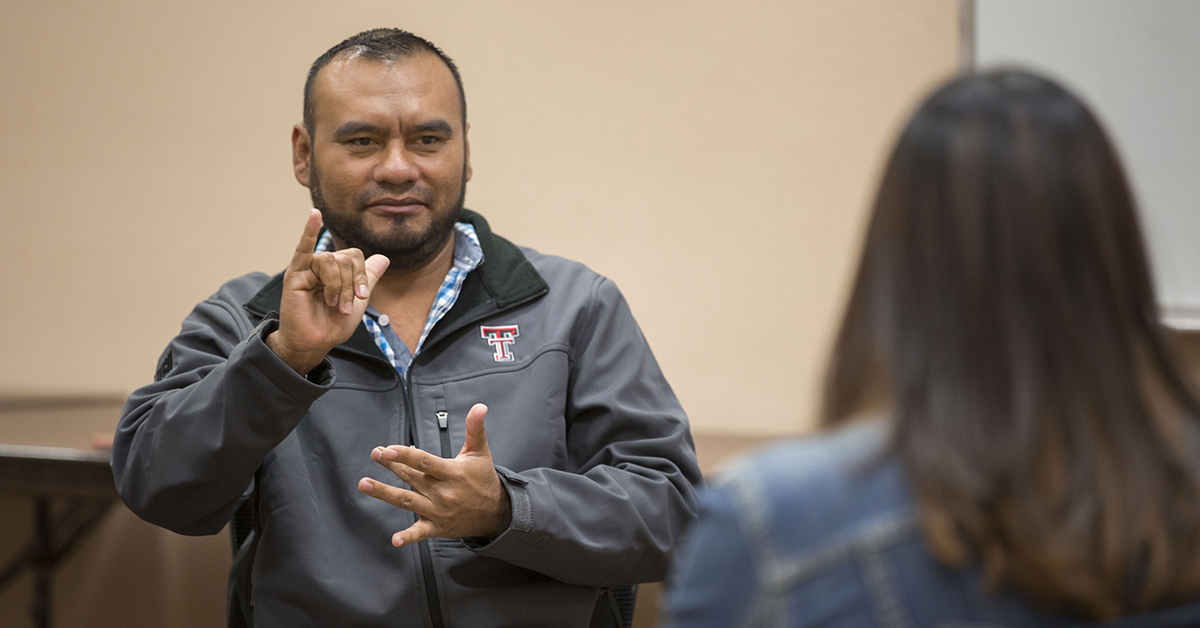A Cross Between Cultures

Bridging the cultures of Nicaragua and Texas, Marwell Guillermo Chavarria Zelaya stood before health care students and professionals and educated them using Nicaraguan Sign Language. As a deaf educator in Nicaragua, Zelaya’s primary language is Nicaraguan Sign Language. Using a basic understanding of Spanish, English and American Sign Language, translators helped him communicate with Texas Tech University Health Sciences Center (TTUHSC) faculty and students.
While at TTUHSC, Zelaya shared insights about current issues Nicaragua faces while highlighting contrasts in special-needs education between Nicaragua and Texas.
“I was so surprised by how early education begins in the states,” Zelaya said. “The three-year olds were at the level of our seven-year olds in sign language. This trip inspired me to encourage earlier education for our deaf students so they can communicate sooner.”
With varying levels of support for disabled students in Nicaragua, Zelaya acknowledged improvements will take time and continued support. His passion for educating the disabled youth of Nicaragua led him to receive the “Teacher of the Year” award in Nicaragua. His vision to improve circumstances and outcomes for these students continues to inspire families in Nicaragua to work with their disabled children and to help students and faculty at TTUHSC.
“Our students learn how to show compassion across cultural and language barriers and learn the value of taking care of the whole person, not just addressing a complaint,” said Patti Patterson, M.D., MPH, TTUHSC professor and global health liaison for Nicaragua. “Students and faculty are always impressed by the knowledge and resourcefulness of the Nicaraguans.” Zelaya encourages his students to push past the stigma of being deaf and to become whatever they can dream of.
The Office of Global Health’s program connects TTUHSC students with incredible health care professionals like Zelaya. Since 2006, more than 500 students and faculty have visited Jinotega, Nicaragua.
“This is a great opportunity for students and faculty from multiple schools and programs to work together,” Patterson said. “This long history of collaboration with Jinotega, Nicaragua has played an integral role in TTUHSC’s global health initiative and the growth and progression of our students. These students learn the invaluable role of service, interprofessionalism and teamwork while being able to gain hands-on learning during their education.”
The Office of Global Health hosts multiple trips each year with students and faculty from TTUHSC’s five different schools. These students serve and help in a variety of settings in the Jinotega community including clinics, the special school, and a nursing home, but never imagine the impact the Nicaraguan people have on them as they return back to the states.
Patterson said the people of Jinotega have contributed so much to the education of TTUHSC students. Zelaya’s visit was an opportunity to educate students and faculty as well as for him to share insights as a special-needs educator in Nicaragua. He helped establish funding for a school in Jinotega that educates disabled Nicaraguan children. This school has a special role in Nicaragua because it is one of the few locations in the country for disabled children to receive an education and learn Nicaraguan Sign Language. Students range from ages 7- to 18-years old and many must travel by horseback to attend the school. The students live in mountainous, rural communities as much as 12 hours away and make huge sacrifices to gain an education.
“TTUHSC has helped our schools a lot,” Zelaya said. “We love having students come to our schools and share their love of learning.” This program not only bridges the cultures of Texas and Nicaragua, but also bridges the gap to furthering special needs education.
For additional information about how you can support the special education school in Jinotega, please contact the Office of Global Health at globalhealth@ttuhsc.edu or visit http://www.ttuhsc.edu/global-health/.
Image Gallery
Related Stories
Celebrating Veterans: TTUHSC’s General Martin Clay’s Legacy of Service and Leadership
From his initial enlistment in the Army National Guard 36 years ago to his leadership in military and civilian health care management roles, Major General Martin Clay’s career has been shaped by adaptability, mission focus and service to others.
Texas Tech University Health Sciences Center School of Nursing Named Best Accelerated Bachelor of Science in Nursing Program in Texas
The TTUHSC School of Nursing Accelerated Bachelor of Science in Nursing (BSN) program has been ranked the No. 1 accelerated nursing program in Texas by RegisteredNursing.org.
TTUHSC Names New Regional Dean for the School of Nursing
Louise Rice, DNP, RN, has been named regional dean of the TTUHSC School of Nursing on the Amarillo campus.
Recent Stories
The John Wayne Cancer Foundation Surgical Oncology Fellowship Program at Texas Tech University Health Sciences Center Announced
TTUHSC is collaborating with the John Wayne Cancer Foundation and has established the Big Cure Endowment, which supports the university’s efforts to reduce cancer incidence and increase survivability of people in rural and underserved areas.
TTUHSC Receives $1 Million Gift from Amarillo National Bank to Expand and Enhance Pediatric Care in the Panhandle
TTUHSC School of Medicine leaders accepted a $1 million philanthropic gift from Amarillo National Bank on Tuesday (Feb. 10), marking a transformational investment in pediatric care for the Texas Panhandle.
Texas Tech University Health Sciences Center Permian Basin Announces Pediatric Residency Program Gift
TTUHSC Permian Basin, along with the Permian Strategic Partnership and the Scharbauer Foundation, Feb. 5 announced a gift that will fund a new pediatric residency.
